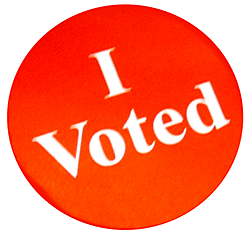SEPTEMBER 24, 2020 – Yesterday I stood in line for an hour to cast my ballot—affirmatively, convincingly, beyond all attempts to lose, miscount, question or disqualify that ballot.
It would be no exaggeration to compare my feelings to how one feels when participating in a ritual of one’s religious organization. Granted, everyone wore a mask and observed social distancing, but I was still struck by the absence of chatter and conversation. Most notably, conspicuously few people were engrossed in text or images on their smartphones.
No one exhibited impatience or discomfort, though the weather gods were certainly smiling upon us. The sun shone at the perfect intensity, and when its warmth threatened to exceed what felt like 72 degrees Fahrenheit, the air around us stirred just enough to maintain that ideal temperature.
During that hour, I observed my fellow citizens. Their patience and posture reflected the gravity of their mission and the solemnity of their action—the exercise of their sacred right and duty to vote in a fair and free election of public officials.
I felt as one feels in communal worship—a bond, a common belief in a set of principles, in a community that is something more than the sum of its individual members. I ventured to guess that I was not alone in these feelings.
I didn’t have to venture far. Yesterday evening while returning from “Little Switzerland” (in reality, the local public golf course), I passed a house with the signs of “my candidates” planted next to a well-tended garden in the front yard. A woman whom I presumed to be the owner was out watering the flowers. “I like your flag!” I called out, referring to the small American flag that she’d placed next to the presidential candidate sign.
“Oh, well, thanks,” she said, hesitantly.
“It’s about time we take back our flag!” I said. She agreed. We talked and soon discovered that we’d both been at the polling place during the same hour. She too had experienced feelings of gravity, solemnity, and connectedness with her fellow citizens by way of subscription to the same ideals around which our government and society are organized.
In the conversation that unfolded, I learned that the woman’s son was working on his PhD at the University of Michigan. His thesis is on Tacitus (56 – 120 C.E.) and parallels between the times of that great Roman politician and historian and our own.
As I continued my way home, I pondered the young man’s thesis—and the perspective that his scholarship must bring in these tumultuous times—no less chaotic than what Rome endured at so many junctures in its history.
And I wondered, if Tacitus had walked by our voting place today, what questions would he have asked? What answers would we have given? What reactions would he have then recorded for the future to read? And what more would he have to write in six weeks’ time?
(Remember to subscribe to this blog and receive notifications of new posts by email.)
© 2020 by Eric Nilsson
